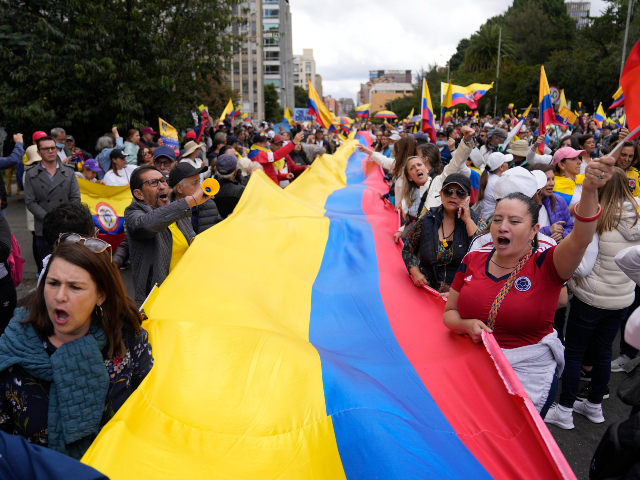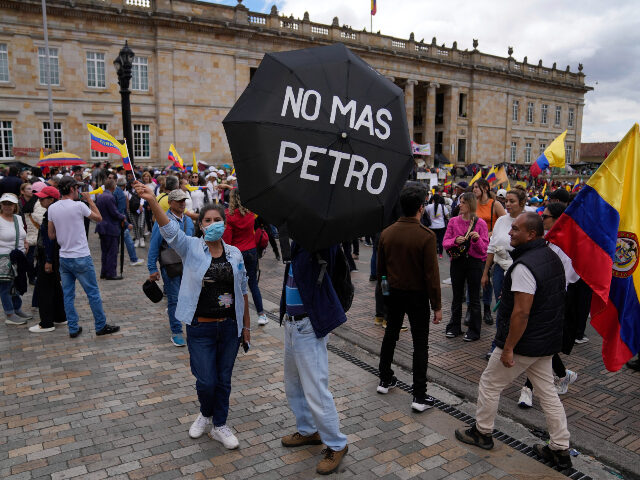Thousands of Colombians flocked to the streets on Wednesday to peacefully express their dissatisfaction with the nation’s far-left President Gustavo Petro and to protest proposed socialist reforms.
The peaceful protests against Petro, titled the “March for Your Freedom,” took place across 12 different Colombian cities. Colombians also organized rallies abroad outside the premises of Colombia’s consulates and embassies in Miami, Orlando, New York, Mexico City, London, and Stockholm. Most of the protesters, who chanted “no to improvised reforms” and “no more Petro” while waving Colombian flags, were dressed in white shirts.
“This Wednesday, February 15, we are going to march against absurd decisions of the anarchist government of Gustavo Petro, such as those of [Colombian Health Minister] Corcho, who seeks to burst the health system putting the lives of Colombians at risk,” Colombian opposition senator María Fernanda Cabal said on Monday via Twitter.
Gustavo Petro, Colombia’s first-ever leftist president and a former member of the Marxist M19 guerrilla, has promoted a series of controversial reforms since taking office in August. The far-left president has waged a fierce campaign against oil and coal – two of the nation’s top exports – and has bizarrely declared them “more poisonous” than cocaine on several occasions. Petro imposed higher taxes on fossil fuels through a sweeping tax reform passed in November.
Petro also announced on several occasions that Colombia will cease awarding new oil and gas explorations contracts to push the South American nation onto a “green” path. His administration intends to replace the lost revenue from oil and gas contracts with tourism.
One of the main rallying points for Wednesday’s protests was to express rejection of a proposed health reform presented by Petro’s government on Monday that, if approved, would see sweeping changes to the nation’s healthcare system.
Critics of the proposed reform have denounced it as a “nationalization” of healthcare and a “destruction of the current system,” as the reform would give the Colombian state a greater role in the nation’s health system while diminishing the function of private healthcare providers – and would eliminate the private sector’s management of payments.

Anti-government protesters demonstrate against proposed reforms in Bogota, Colombia, Wednesday, Feb. 15, 2023. (AP Photo/Fernando Vergara)
Another proposed reform, yet to be finalized and presented to the Colombian Congress, would grant benefits to drug traffickers if they submit to justice and collaborate with Petro’s “total peace” policies. The benefits include reduced sentences of between six to eight years. Petro also proposed allowing drug traffickers to keep a percentage of the money illegally obtained from their crimes.
Similarly, Petro’s decision to grant clemency and a monthly stipend of 1 million Colombian pesos (roughly $200) to criminals arrested in the violent leftist riots in 2021 if they become “spokespersons for peace” was another of the rallying points of the Wednesday protests.
The peaceful protests against Petro took place one day after the far-left president rallied his sympathizers on Tuesday to support his government and proposed reforms. The pro-Petro supporters marched from several points of the Colombian capital of Bogotá, arriving at the presidential Palacio de Nariño, where Petro addressed them with a speech.
Colombia’s national police estimated that 47,000 citizens participated in Wednesday’s protests against Petro. In contrast, the Colombian Police estimates that Petro’s rally on Tuesday counted with the participation of 28,099 of his sympathizers.
Once the protests were over, the mayor of Bogotá, Claudia López Hernández, thanked the participants for having peacefully protested and not caused any damages to the capital city.
“I thank all the citizens who marched yesterday and today for demonstrating that we can exercise political and democratic controversy peacefully. That is the true total peace that we must exalt,” López Hernández said.
The events of Wednesday are not the first time Colombians have taken the streets en masse to protest against Gustavo Petro. In September, a larger group of 60,000 Colombians took the streets across 35 cities to protest against Petro’s tax reform and his decision to have Colombia reestablish ties with the neighboring authoritarian socialist regime of Venezuela and its dictator Nicolás Maduro.
Christian K. Caruzo is a Venezuelan writer and documents life under socialism. You can follow him on Twitter here.

COMMENTS
Please let us know if you're having issues with commenting.